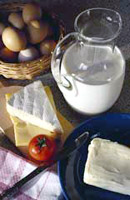Women who get most of their daily calcium from food have healthier bones than women whose calcium comes mainly from supplemental tablets, say researchers at Washington University School of Medicine in St. Louis. Surprisingly, this is true even though the supplement takers have higher average calcium intake.

“Only about 35 percent of the calcium in most supplements ends up being absorbed by the body,” Armamento-Villareal says. “Calcium from the diet is generally better absorbed, and this could be another reason that women who got a high percentage of calcium in their food had higher bone densities.”
Although dairy foods are excellent sources of calcium, Armamento-Villareal suggests that individuals with dairy sensitivities could consume other calcium-rich food sources such as calcium-fortified orange juice. Dark green leafy vegetables also contain calcium, but it is not as readily absorbed as calcium from dairy sources.
Napoli N, Thompson J, Civitelli R, Armamento-Villareal RC. Effects of dietary calcium compared with calcium supplements on estrogen metabolism and bone mineral density. American Journal of Clinical Nutrition 2007;85:1428-1433.
Funding from the National Institutes of Health and the General Clinical Research Center at Washington University supported this research.
Washington University School of Medicine’s full-time and volunteer faculty physicians also are the medical staff of Barnes-Jewish and St. Louis Children’s hospitals. The School of Medicine is one of the leading medical research, teaching and patient care institutions in the nation, currently ranked fourth in the nation by U.S. News & World Report. Through its affiliations with Barnes-Jewish and St. Louis Children’s hospitals, the School of Medicine is linked to BJC HealthCare.